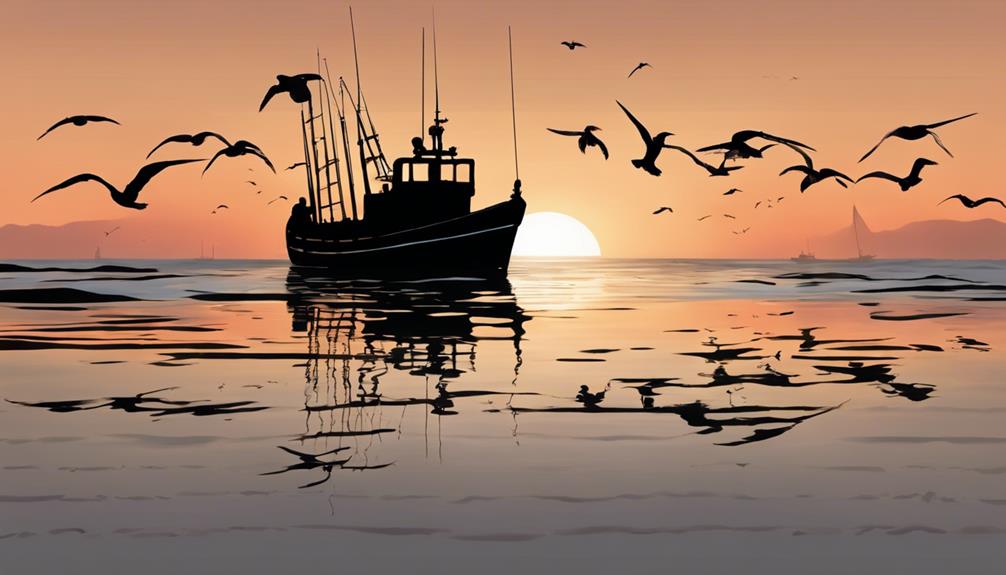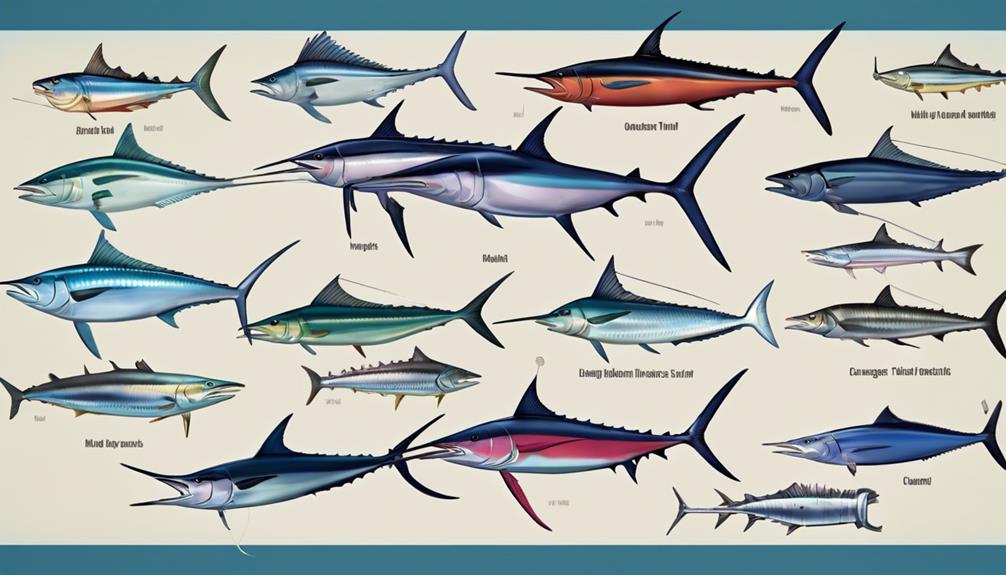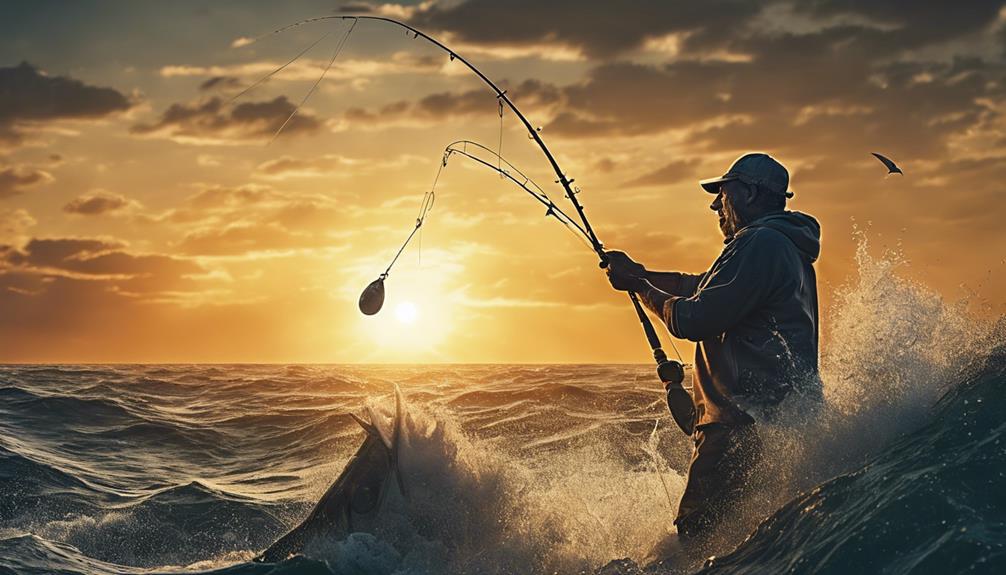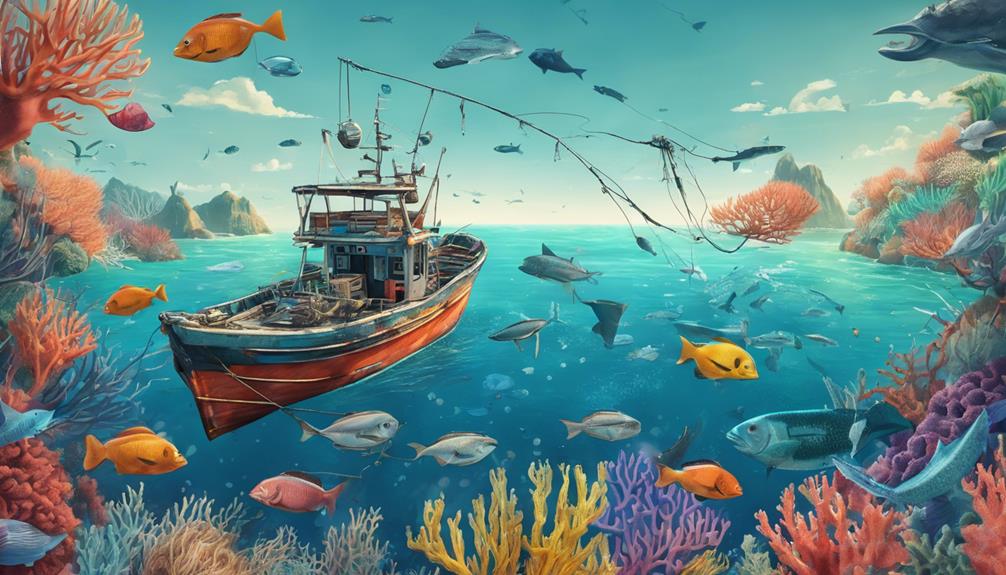Discover the dynamic details of deep sea fishing during the diverse seasons for an enriching experience.
While summer shines as the peak period for anglers seeking a bounty of big catches, winter lures in with its own unique allure.
As you navigate through the seasons, each harbors its own secrets and strategies waiting to be uncovered.
Explore the depths of the sea and find out when you can reel in the biggest rewards.
Summer: Peak Deep Sea Fishing Season
Summer is when deep sea fishing reaches its peak, offering the best opportunities for anglers to reel in impressive catches. During this season, understanding tidal patterns is crucial for a successful fishing trip. Fish behavior is closely tied to the tides, as they often feed more actively during certain tidal phases. Anglers should plan their outings around high activity periods to maximize their chances of a good catch.
Moreover, summer weather conditions play a significant role in determining fishing success. Clear skies and calm seas are common during this season, providing optimal fishing conditions. The warm waters attract a wide variety of fish species, from marlin to tuna, creating a diverse fishing experience. With the right gear and knowledge of fish habits, anglers can capitalize on these conditions to hook some prized specimens.
In summer, deep sea fishing enthusiasts can expect thrilling battles with powerful fish species attracted to the warm waters. By observing tidal patterns, understanding fish behavior, and taking advantage of favorable weather conditions, anglers can increase their chances of a successful and rewarding fishing expedition. So, prepare your gear, set sail, and get ready for an unforgettable deep sea fishing adventure this summer.
Winter: Off-Season Deep Sea Fishing
While winter may not be the peak season for deep sea fishing, it offers its own unique opportunities for anglers seeking a different experience. Winter fishing in the deep sea can be a rewarding venture for those willing to brave the cold weather and take advantage of off-season charters.
Off-season charters during the winter months may provide a more intimate and peaceful fishing experience as there are fewer crowds compared to the busier summer season. The colder temperatures also bring about changes in fish behavior, leading to the possibility of catching different species or encountering larger fish that prefer the cooler waters.
When heading out for winter deep sea fishing, be prepared for the cold weather by layering up with warm clothing and appropriate gear. The winter months can be unpredictable, so checking weather conditions beforehand and ensuring you have the right equipment will make your fishing trip more comfortable and enjoyable.
Some popular winter deep sea fishing destinations include areas known for their abundance of certain fish species during this time, such as cod, haddock, or winter flounder. Researching the best locations and consulting with local captains or fishing experts can help increase your chances of a successful winter fishing trip in the deep sea. So, don't let the colder weather deter you – embrace the unique challenges and rewards that winter deep sea fishing has to offer.
Spring: Ideal Time for Fishing Charters
Spring presents an optimal window for embarking on fishing charters, offering favorable conditions for anglers to maximize their deep sea adventures. The moderate temperatures and calmer seas during spring make it an ideal time to head out for a memorable fishing experience.
When planning your spring fishing charter, keep in mind the following tips:
- Spring fishing: Take advantage of the abundance of fish species that are more active during the spring months. From snappers to groupers, spring offers a diverse range of targets for anglers.
- Gear essentials: Make sure to pack appropriate gear for spring fishing, including light jackets for the cooler mornings and sunscreen for the increasingly sunny days.
- Charter discounts: Many charter companies offer discounts during the spring season to attract more customers. Keep an eye out for special deals to make the most of your fishing trip.
- Booking tips: Plan ahead and book your fishing charter in advance to secure your spot and potentially benefit from early booking discounts. Consider weekdays for less crowded charters and more personalized experiences.
- Local knowledge: Capitalize on the expertise of local captains during spring. They can guide you to the best fishing spots based on the seasonal movements of fish.
With these tips in mind, spring sets the stage for an unforgettable fishing charter experience filled with excitement and success.
Fall: Transition Period for Anglers
As the temperatures cool and the season shifts, your deep sea fishing adventures take on a new dynamic during the fall months. Fall fishing techniques become essential during this transitional period. As the weather patterns change, fish behavior also shifts, requiring anglers to adjust their strategies accordingly.
During the fall, fish tend to move to deeper waters as they follow their prey. This means that you may need to adjust your bait and tackle to reach these deeper levels where the fish are congregating. Jigging and bottom fishing are popular fall fishing techniques that can help you target the fish that have moved to lower depths.
Fall weather patterns can be unpredictable, with changing winds and occasional storms. It's crucial to stay updated on weather forecasts and plan your fishing trips accordingly. While fall can bring some windy days, it can also offer calm seas and great fishing opportunities. Being prepared for changing weather conditions is key to a successful fall deep sea fishing expedition.
To make the most of the fall transition period for anglers, adapt your fishing techniques to target fish in deeper waters and stay informed about the changing weather patterns. With the right approach, fall can be a rewarding time for deep sea fishing adventures.
Early Morning: Best Time to Set Out
Consider setting out early in the morning for your deep sea fishing adventure, as it's often regarded as the best time to start your day on the water. The calmness of the morning sea, the opportunity to witness a stunning sunrise, and the increased chances of catching certain fish species make it a favorable time to embark on your fishing journey.
- Prepare Your Gear Ahead of Time: Get your fishing gear ready the night before to maximize your time on the water.
- Focus on Topwater Lures: During early mornings, fish are more likely to be near the surface, so using topwater lures can be highly effective.
- Watch for Birds: Seabirds are often active in the early hours, indicating the presence of baitfish and potentially larger predatory fish.
- Stay Hydrated: Even in the morning, the sun can be intense, so remember to bring plenty of water to stay hydrated.
- Be Mindful of Other Boats: Early mornings can be popular for fishing, so be courteous and mindful of other anglers around you.
Afternoon: Optimal Fishing Hours
Wondering when the optimal fishing hours are during the afternoon for your deep sea fishing expedition? Late afternoon is a prime time for fishing due to the optimal fishing conditions that prevail during this period. Afternoon bites tend to be more frequent, maximizing catch rates and providing an exciting experience for anglers.
During the late afternoon, the water temperature is typically warmer, which can lead to increased fish activity. This is especially true for species like tuna and mahi-mahi, which are known to be more active during these hours. Additionally, the lighting conditions during the late afternoon can make it easier for fish to spot your bait, leading to more bites.
To make the most of the optimal fishing hours in the afternoon, consider using live bait or lures that mimic the movement of prey fish. This can help attract the attention of predatory fish and increase your chances of hooking a big catch. Paying attention to factors such as water depth, currents, and underwater structures can also help you identify the best spots to fish during this time.
Evening: Sunset Fishing Excursions

For a memorable deep sea fishing experience as the day transitions into evening, consider embarking on sunset fishing excursions. As the sun starts to dip below the horizon, the waters take on a serene quality, making it an ideal time to reel in some impressive catches. Sunset fishing trips offer a unique and tranquil setting that avid anglers will appreciate.
Tips for Sunset Fishing Excursions:
- Timing is Key: Plan your trip so you can start fishing at least an hour before sunset to take advantage of the twilight catches.
- Pack Proper Gear: Ensure you have adequate lighting for when darkness sets in, as well as warm clothing as temperatures can drop once the sun goes down.
- Choose the Right Bait: During sunset, fish tend to be more active, so consider using live bait or lures that create movement to attract them.
- Be Mindful of Wildlife: Sunset is a prime time for marine wildlife sightings, so keep an eye out for dolphins, whales, or seabirds that may enhance your experience.
- Enjoy the View: Take a moment to appreciate the stunning sunset over the ocean while waiting for your next big catch.
Night: Specialized Night Fishing Trips
Embark on specialized night fishing trips to explore the unique opportunities and challenges of fishing under the cover of darkness. When venturing out for a night fishing expedition, proper tackle selection is crucial. Opt for sturdy equipment that can handle larger catches that are more active during the nighttime. Utilize glow-in-the-dark or light-up bobbers to easily track your lines in the darkness. Additionally, consider using heavier fishing line to prevent breakage when reeling in potential trophies lurking in the depths.
Night fishing techniques vary from traditional daytime methods. Try vertical jigging to attract predatory fish that are more active during the night. Experiment with slow trolling to cover a larger area and increase your chances of hooking a catch. Keep in mind that fish may be more cautious at night, so finesse and patience are key to a successful outing.
The moon phase plays a significant role in night fishing success. During a full moon, visibility is higher, and fish may be more active. Conversely, during a new moon, darkness prevails, and fish tend to feed more aggressively. Adjust your bait choices accordingly, opting for noisy or scented baits to attract fish in low-light conditions. By understanding these factors and adapting your approach, you can enhance your night fishing experience and reel in some impressive catches.
Frequently Asked Questions
What Are the Best Types of Fish to Catch During Each Season for Deep Sea Fishing?
When going deep sea fishing, you'll want to target specific types of fish depending on the season. Different seasons mean various species are more active.
For example, in the summer, you can aim for tuna and mahi-mahi. Use live bait like squid or artificial lures to attract them. Adjust your fishing techniques according to the species you're targeting.
Stay prepared and flexible to maximize your chances of a successful catch.
Are There Any Specific Locations or Regions That Are Better for Deep Sea Fishing During Certain Times of the Year?
For the best deep sea fishing experience, consider the peak seasons and hotspots for specific regions. Different locations offer unique opportunities for catching various fish species. Research the best locations and techniques tailored to your desired catch.
Local charters and guides can provide valuable insights on where and when to fish for optimal results. By focusing on specific regions and their prime seasons, you can increase your chances of a successful deep sea fishing trip.
How Does the Weather and Ocean Conditions Vary Throughout the Different Deep Sea Fishing Seasons?
Throughout the different deep sea fishing seasons, weather patterns can shift dramatically, affecting ocean currents and tides. These changes impact marine life behavior, influencing your fishing experience.
Are There Any Specialized Equipment or Techniques That Are Recommended for Deep Sea Fishing During Specific Seasons?
During specific seasons, you'll find that deep sea fishing requires different techniques and specialized gear. Seasonal techniques can vary for catching certain types of fish, like adjusting bait depth or trolling speeds.
Specialized gear, such as heavy-duty reels or high-test fishing line, may be recommended for targeting larger fish during certain times of the year.
It's essential to research and prepare accordingly to maximize your success on the water.
Are There Any Festivals or Events Related to Deep Sea Fishing That Take Place During Different Times of the Year?
If you're interested in deep sea fishing, you'll be glad to know that there are several fishing tournaments and competitions that take place throughout the year. These events bring together fishing enthusiasts from all over to showcase their skills and compete for prizes.
Additionally, many of these tournaments also promote marine conservation efforts and sustainability initiatives to help protect the ocean and its inhabitants. Get ready to reel in some big catches and support a good cause!
Conclusion
So whether you prefer the peak summer season or the tranquil winter months, there's always an optimal time for deep sea fishing.
From early morning excursions to nighttime trips, each season and time of day offers unique opportunities for anglers.
Make the most of your fishing experience by planning your trips accordingly and taking advantage of the best times to set out on the water.
Happy fishing!



